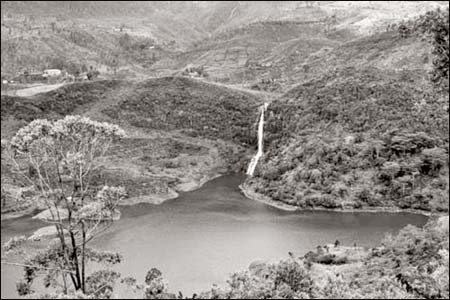|
‘e-tourism’ is the answer:
With more links and no leaks
Lionel Wijesiri
Sri Lanka’s tourist earnings last year has topped US $ 325 million
and, given the prevailing upward trend, it will most likely reach US $
700 million this year. The earnings began to rise steeply from the
second half of the last year. From January to July this year 342,000
tourists arrived in the country and when compared with same period of
the last year, it is nearly a 49% increase. Tourism, once again, is
becoming one of the country’s leading economic sectors and we can now
look forward to better foreign exchange earnings in the coming years.
|

leopard at a water hole |
Yet, it is easily said than done. As a modality of international
commerce, tourism involves not only inflows of foreign financial
resources but also outflows, referred to as “leaks”. When they exceed
specific levels, these outflows can significantly neutralize the
positive financial effect of a country’s earnings from tourism.
Leakage is the process whereby part of the foreign exchange earnings
generated by tourism, rather than being retained by tourist-receiving
country, is either retained by tourist-generating countries or
repatriated to them in the form of profits, income and royalty
remittances and promotional expenditures. The average leakage for most
developing countries today is between 40 and 50 percent of gross tourism
earnings for small economies and between 10 and 20 percent for most
advanced and diversified developing countries.
Unfortunately, world tourism today is mostly concentrated in a
handful of Multi National Enterprises in developed countries, which both
run the business and reap the benefits. Most inward and outward global
tours are planned, booked and financed through them. With their obvious
technological advantage, these providers carry out most of the sales
transactions and absorb a large share of the profits.
ICT Package
The e-tourism concept offers a chance to change that pattern. This is
a novel type of tourism which has emerged with the advent of new forms
of ICT that is radically transforming the international tourism
industry.
Many potential travellers are now shopping for their vacations
online, and we have the chance to court these customers directly,
offering domestic flavour, unique experiences and local knowledge that
can trump overseas competition. However, the challenge is to reorganize
tourism services and set up well-linked websites that allow domestically
owned hotels, banks and travel firms to provide the entire package of
services necessary for tourists to arrange their trips - reservations,
plane flights, currency exchange and payments. That way the profits can
stay at home and contribute to job growth and economic development It is
not an easy task and needs heavy amount of investment.
Here, the Government needs to play a central role by providing the
investment in technical infrastructure and guidance. The stiff
investments necessary may be worth the cost: effective tourism marketing
through the Internet can help us to build our own brand images, develop
new products, promote our tourism resources, expand our customer bases,
and keep a much higher share of tourism profits.
Policy
|

Elephant safari |
But what can the Government do to support the adoption of e-tourism
by the business sector, and particularly SMEs? How much should be left
to the business sector itself and where should the government
intervention necessary? These are difficult problems to be tackled by
the Government.
In order to answer these questions, first of all , the Government
must formulate and implement an effective e-tourism policy. This
requires the involvement of all stakeholders, including the public
sector, the business community and NGOs. National e-tourism policy and
strategies should include measures to improve human skills and the
capacity to apply ICTs, develop and improve infrastructure; build a
legal and regulatory framework that can create trust and confidence and
support the growth of e-tourism; provide incentives and support for the
adoption of e-tourism, especially among SMEs; and establish mechanisms
to monitor and measure e-tourism access and usage and to facilitate
planning and benchmarking of progress.
CRM Solutions
E-tourism is more than just flashy websites; it allows local
suppliers and service providers in the tourism sector to structure their
products in such a way as to make them visible, accessible and
competitive in the global marketplace. E-tourism makes it possible for
niche products to reach niche markets. The potential and benefit - for
both backward and forward linkages is therefore enormous.
Customer relationship management (CRM) based system enables tourist
service provider to offer knowledge, value and efficient service to its
overseas clients. CRM enables service the local organisation to build up
a life time relationship by providing on time solutions. Tourism
industry needs excellent CRM solutions to assist visitors or clients
before flying on tour, during tour and always after tour services. CRM
solutions can be provided to a visitor through web, email, communication
centres, kiosks and travelling information offices anytime & anywhere.
Just imagine how beneficial is it for a tourist to know status of his
reservation by dialling just a designated telephone number. Or maybe, he
is standing at “Sigiriya” and is able to read history details with all
graphics and animated roles on his laptop or multimedia com-centre. Even
he can check his further travel registration request process through any
laptop.
Interactive Digital Television (IDTV), Mobile technologies and
Internet are carving new faces in customer services for tourism
industry. Using GPRS and GIS, KM and BI can be easily integrated on
maps. It is in process. That’s great for adventure tourist. Where am I?
You are in dangerous forest. Beware!!
Through a mobile, tourist can be guided through cultural heritage
through multi – language voice, text or images. Even it is possible for
a tourist to find details on fees, opening days and timings for nearby
places. Find bookshop, cafe, restaurant or ATM from where ever he is.
These are examples of what are available in advanced countries. In
those countries, e – tourism concept was applied and put in practice in
full form. However e – tourism is still in growing phase with advance
technology’s application. But for a developing country like Sri Lanka,
it is under utilization phase. Our e-tourism policy should plan to reach
this advanced stage within the next 5 years.
|

Scenic beauty |
Success Stories
There are many success stories of the countries who adapted
e-tourism. Malaysia is one. The Malaysian government’s tourism website
was described as a model of e-tourism by the Secretary of UNCTAD.
He said in many ways the website was a model with superb display of
marketing information, graphics and designs directing visitors
immediately to separate portals for consumers and business travels.
“Relevant information is available at one’s fingertips. This is the
marvel of e-tourism, a dramatic demonstration of burgeoning partnership
between technology and the travel industry,” he said when opening UNCTAD
Conference on “Asia-Pacific; E-tourism for Growth. Today, the portal has
more than 500 industry partners and receives more than 30 million hits a
month. There are many more success stories.
The initiatives to promote and develop e-tourism in Thailand reported
150,000 hits on its booking websites with over 1,000 confirmed bookings
monthly when they started few years ago. Similarly Cambodia’s website
saw 230,000 visits and one of its hotels reported that 70% of its
revenue came from online bookings since they begun online bookings about
three years ago. Vietnam’s website attracted 7.5mil users.
The adoption of e-tourism concept has become one of the choices that
seem unavoidable because they bear so directly on the prospects for
competing and even surviving in the highly competitive global tourism
economy.
With small tourism enterprises representing numerically the dominant
form of tourism operators, tourism playing a major economic role and
contributing to poverty alleviation focusing on e-tourism should be an
essential piece of tourism development. |



